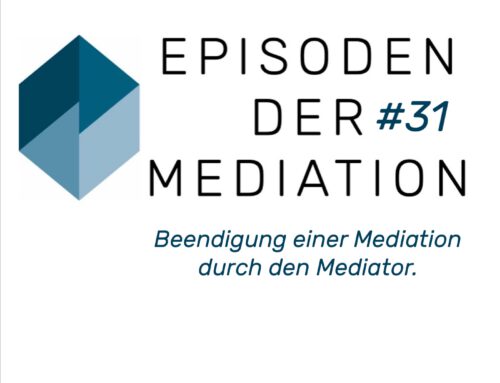Mediation and the Ulysses Pact
Or why we should sometimes deprive ourselves of our freedom.
What is the Ulysses Pact?
Odysseus was a brave man. He wanted to hear the voices of the sirens and take a dangerous risk. He knew that it was every man's undoing to hear the voices of the sirens that made them set course for the island where the ships were wrecked by the surf. And yet, he wanted to hear the sirens sing. It was the only way he could experience their uniqueness.
But Odysseus was also a clever man. He knew that his LATER SELF would not make smart decisions. The clever ODYSSEUS NOW had to protect the stupid ODYSSEUS LATER from doing anything stupid.
It was therefore important to arrange things in such a way that smart decisions could still be implemented even if the fool were at the helm. The Future problem one irrational Odysseus is realised by a sensible Odysseus currently resolved. Such a pact with oneself at an early stage, which enables rationality and prudence, is called the Odysseus Pact.
Examples of Odysseus pacts
If we look around us, we can still see Ulysses pacts, or at least elements of them, everywhere.
- People arrange to go jogging with friends so that they can actually go running at the crucial moment – and not give in to the temptations that arise just then and are always more attractive.
- With the union for life, (legal and social) hurdles are also built up, which should also get the project through difficult times.
- Alcoholics and smokers destroy their supplies so as not to give in to the temptation in a weak moment to take another whiff of the bottle or „ just a small“ puff.
- During exam periods, students deactivate their Facebook account so that they are not distracted during preparation time and can stick to their study plan.
- The neurobiologist David Eagleman even tells of a civil rights activist who wrote an expensive cheque to the Ku Klux Klan and then gave it to a friend with instructions to send it if she ever smoked another cigarette (The Brain, p. 130).
What is remarkable about it? In all cases - and this is the core of the Odysseus Pact - people meet Determinations for the future; they bind themselves to the mast that already saved Odysseus so that he could achieve something extraordinary. With this trick, people can resist the temptations that would seduce the future ME.
What is decisive? People who enter into the Ulysses Pact know each other; they know that they are different people in different situations, make different decisions and ultimately cannot fulfil their goals.
If you want to make and implement good decisions, you should know yourself in all facets and take precautions.

What does the Ulysses Pact have to do with conflict management and mediation?
The insight that is the reason and basis for the Ulysses Pact does not only apply to individuals or private problems, but also to social systems, organisations and people in conflict. This is why modern conflict management in organisations and mediation in general also recognise Manifestations of Odysseus pacts.
1. so that mediation takes place: Mediation agreements in the form of mediation clauses
The agreement between two parties to submit the current or a future conflict to mediation is called a mediation agreement. If this agreement is made at a time when no conflict has yet broken out, but as a precautionary measure, then it is a mediation agreement. Mediation clause. Mediation clauses are contractually formulated rules which, in terms of content mutually establish the obligation to reach a solution in the event of conflict by means of third-party assisted negotiation and to take the necessary steps to this end. Mediation does not come about by itself (with the mediation clause per se).
The mediation agreement, even in its preventive form as a mediation clause, is only effective if the declarations Legally binding should be. Legal experts say that they must be declared with the intention to be legally binding. Bloose declarations of intent are not enough.
If the will is expressed in a legally binding manner that mediation will be carried out in the event of a conflict (instead of, for example, a lawsuit being brought), then the parties bind themselves in the sense of an Odysseus pact at a time when they can make reasonable decisions because they know that in the event of a conflict they will be „other people“ who would not even get themselves into the clarifying situation of mediation.
Few things seem more sensible, if people seriously and creatively want to create something, than making mediation agreements at an early stage, right?
2. to enable mediation: Dispute boards
Similar to Mediation clauses In the plant and project construction business, for example, there is also a kind of Ulysses Pact concluded. This also takes the form of contractual addresses that bind the parties involved at an early stage and contain procedural guidelines for the hectic pace of an emerging conflict. You must utilise the expertise of neutral third parties to mediate and settle conflicts.
Sog. Dispute Boards ensure the success of the project by being set up in advance and acting as a supporting body should the potential for conflict in the project materialise. The International Chamber of Commerce (ICC), for example, offers permanent dispute boards for out-of-court dispute resolution in commercial matters.
3. so that lawyers can also participate: Disqualification clauses for collaborative law proceedings
Collaborative Law is a consensus-orientated dispute resolution procedure that makes use of the findings of mediation and mediation skills, but not a mediator. Instead of a third party, a mediator, the mediation-competent legal advisors of the parties to the dispute act and commit them to working out an out-of-court solution. To this end, the legal advisors take over the dispute exclusively for the out-of-court negotiations and contractually undertake not to take the case to court as legal counsel. They contractually disqualify themselves for the court case in advance – with what is known as a "waiver". Disqualification clause. This means that they are effectively conducting „mediation without a mediator“, which puts them in a challenging dual role:
- On the one hand, they are biased representatives of their clients,
- On the other hand, they act jointly as leaders of the mediation-analogue negotiation procedure.
This is also an application of an Odysseus pact.
Conserve decisions in order to act revolutionary
Ulysses pacts sometimes display a peculiar paradox. By preserving decisions, they enable revolutionary realisations. What examples do you know of Odysseus pacts?





What is the meaning of the Odysseus Pact and how does this concept help individuals in making rational decisions in the future?